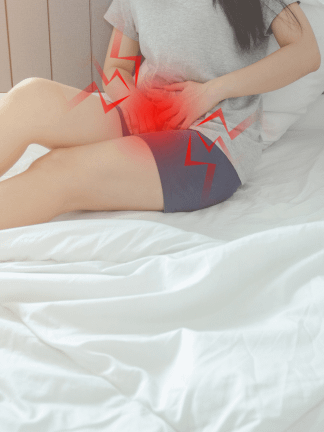Vaginal itch and discomfort can be a troubling issue for many women, but it is nothing to be embarrassed about. Understanding the causes of vaginal itching and knowing effective remedies can provide relief and improve one’s quality of life. This article aims to explore the various reasons for vaginal itch and discomfort and offers guidance on how to stop itching down there, including what products to use, ensuring relief and well-being.
Key Takeaways
- There are various causes of an itchy vaginal area that women should be aware of1-3
- Women should always practice hygiene care for their intimate areas4
- Women should speak with a healthcare professional for a proper diagnosis and for symptoms that don’t resolve on their own3
Causes of Vaginal Itch and Discomfort
Yeast Infections
A common cause of an itchy vulva is a yeast infection.1 It is characterized by a white, cheesy discharge; itchiness and irritation in the vulval and vaginal area; and soreness and stinging while peeing or having sex.1
Bacterial Vaginosis
Bacterial vaginosis is another common cause of vaginal discomfort resulting from an imbalance of the natural bacteria in the vagina.2 Although not all women will show symptoms, they can include: a strong, fishy vaginal odor; a thin white or grey vaginal discharge; vaginal itching, pain or burning; a burning feeling while peeing; and vulval itching.2
Sexually Transmitted Infections
Certain sexually transmitted infections, such as genital herpes, trichomoniasis, and gonorrhoea, can cause vaginal itching and discomfort, as well as other symptoms such as changes in vaginal odor and discharge.3 See your healthcare professional if you think you may have sexually transmitted infection.
Chemical Irritants and Allergens
Everyday products like soaps, detergents, and feminine hygiene products can irritate the delicate skin around the vagina, leading to vaginal itching and discomfort.3 Some women may be allergic to certain fragrances or compounds that lead to skin reactions and vaginal itching. Some examples include tee tree oil and latex condoms.4
Menopause and Low Estrogen
The hormonal changes during menopause, as estrogen levels decline, can lead to vaginal itching and dryness due to the thinning of vaginal tissues and decreased lubrication.3
Skin Conditions
Conditions like eczema, psoriasis, and lichen sclerosus can affect the vulvar skin and cause women to experience an itchy vulva.4
Remedies for Vaginal Itch
Vulvar skin conditions and vaginal itch are treatable, but the treatment will depend on the cause. It is always a good idea to speak with a healthcare professional if ‘at home’ remedies do not work or if you suspect a more serious health problem.1,3,4
Along with seeking medical care, here are some general recommendations on how to help stop itching down there:
- Dry properly after washing1,4
- Wear cotton underwear1,4
- Avoid sex until infections have cleared1
- Change your underwear daily3
- Use gentle care and cleansers for your delicate intimate skin4
If you are wondering what products you can use to help with vaginal itch caused by infections, use Povidone-Iodine (BETADINE®) Antiseptic Feminine Wash which provides expert hygiene to help care for your external intimate area as it kills bacteria, fungi and viruses based on in vitro studies. It also relieves external itching and irritation.5
Always read the label before use.
This article is for educational purposes only. If symptoms persist, consult a doctor.
ASC I0006P071025B
ASC I0006P071025B

